北师大版高中英语必修四Unit 12 culture-shock Communication Workshop 课件(30张PPT)
文档属性
| 名称 | 北师大版高中英语必修四Unit 12 culture-shock Communication Workshop 课件(30张PPT) |

|
|
| 格式 | zip | ||
| 文件大小 | 3.0MB | ||
| 资源类型 | 教案 | ||
| 版本资源 | 北师大版 | ||
| 科目 | 英语 | ||
| 更新时间 | 2019-06-30 00:00:00 | ||
图片预览

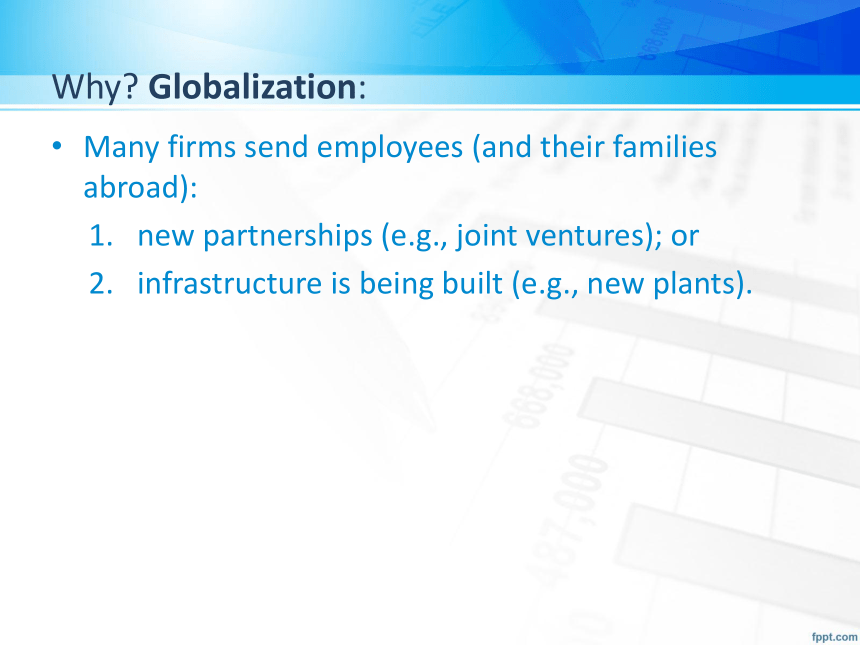

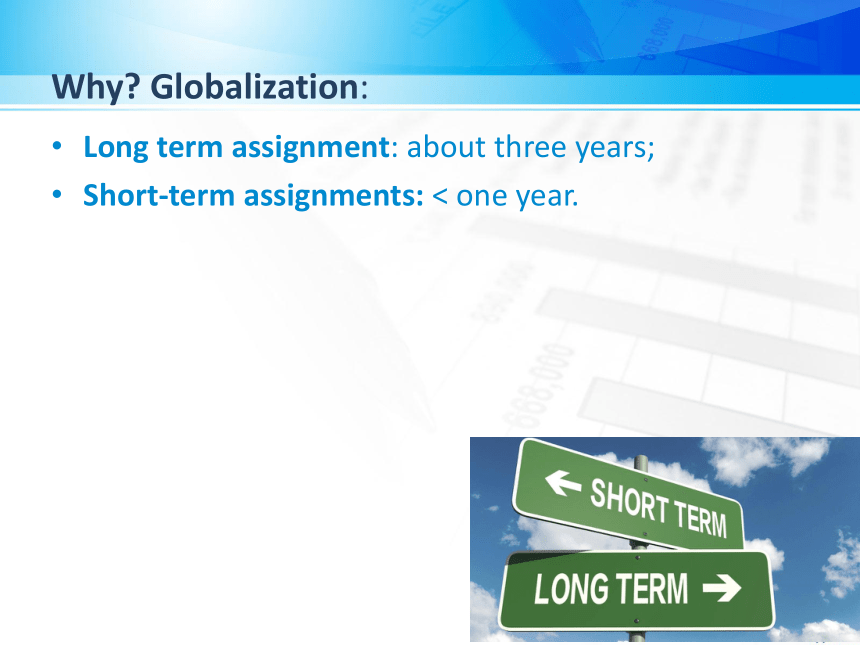
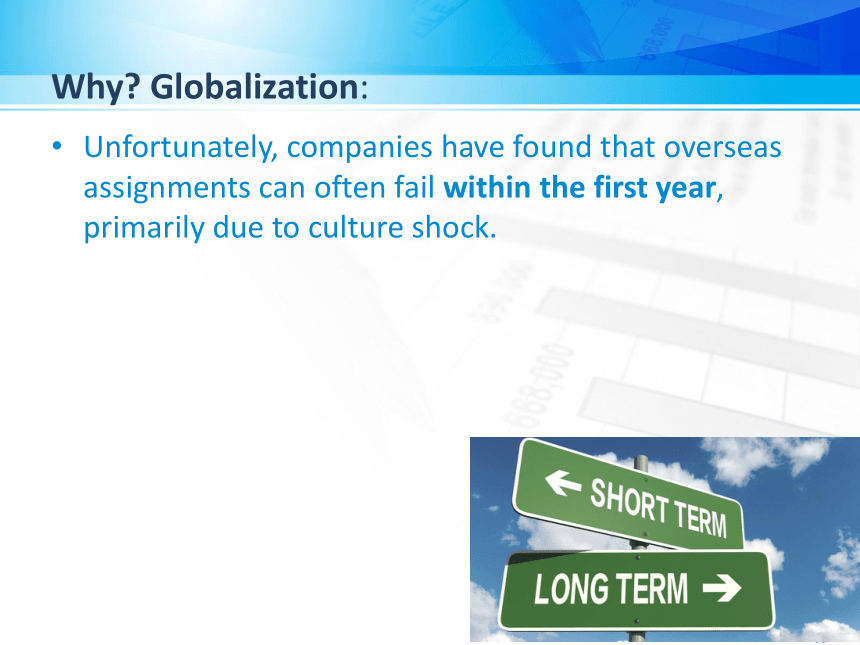
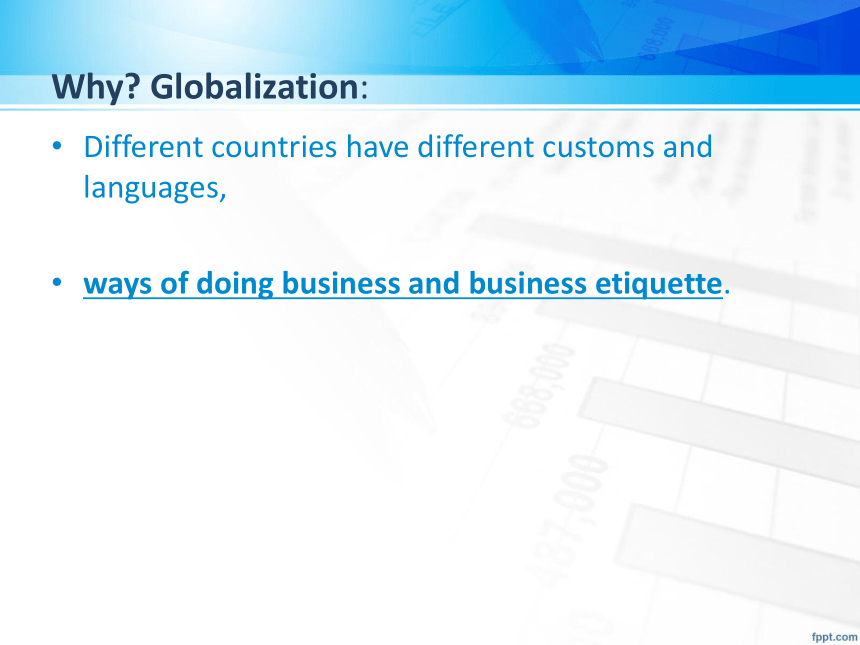
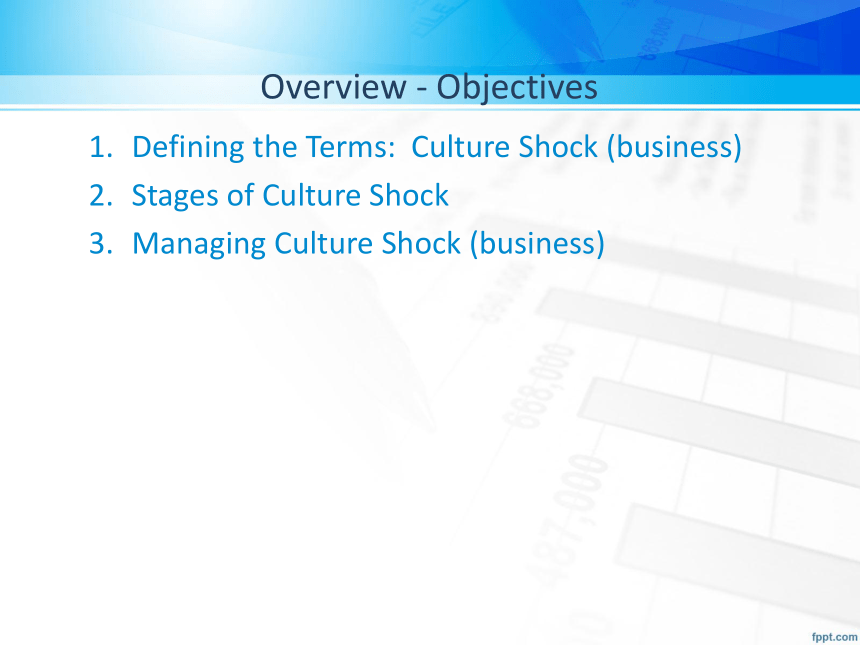
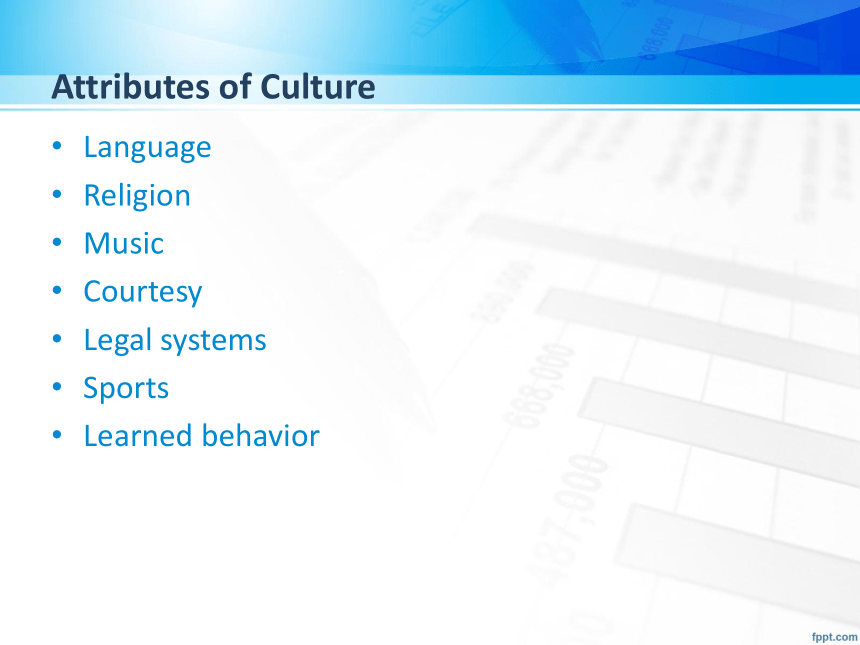
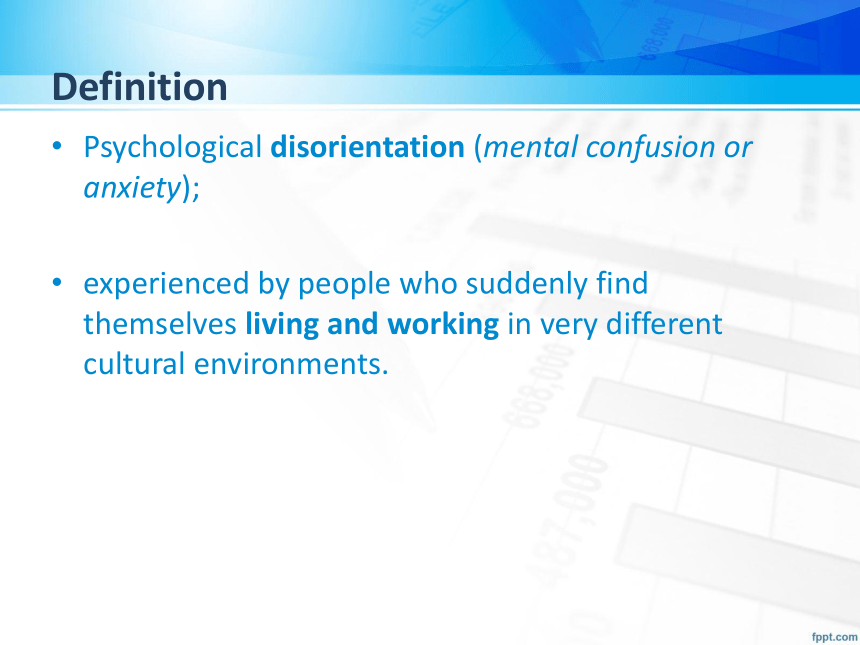
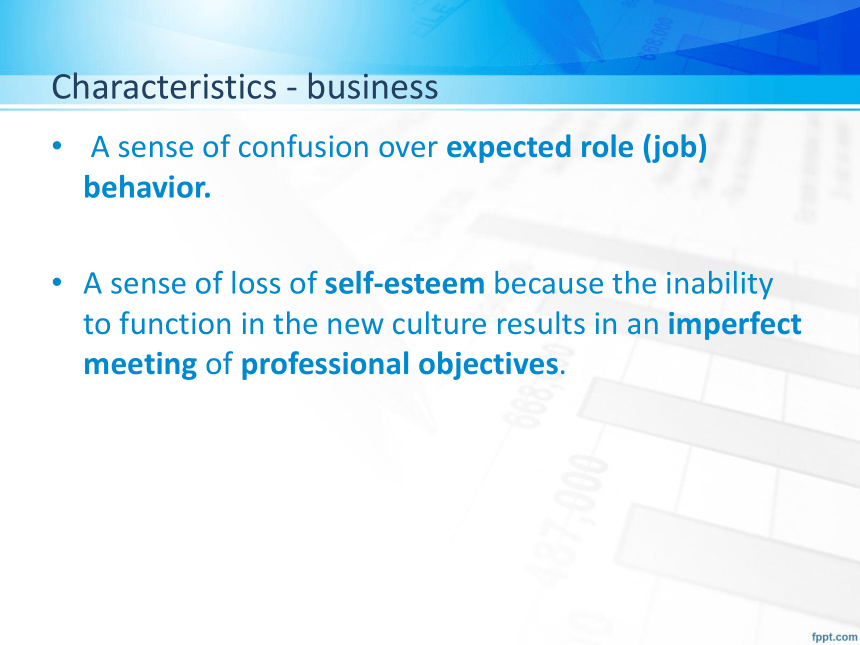

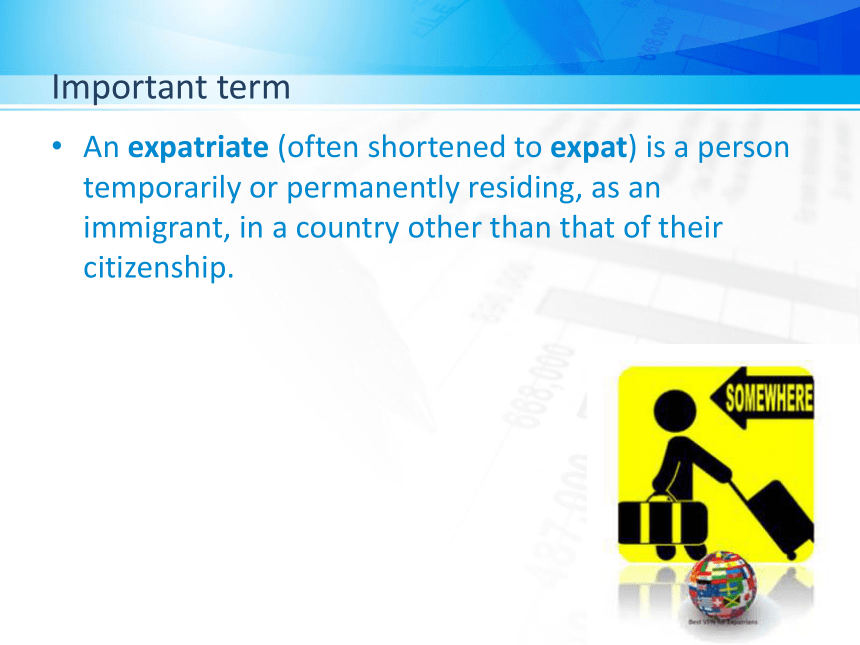
文档简介
(共30张PPT)
INTERNATIONAL
BUSINESS CULTURE
Instructor : Mr. Phillip Connelly
Why? Globalization:
Many firms send employees (and their families abroad):
new partnerships (e.g., joint ventures); or
infrastructure is being built (e.g., new plants).
Why? Globalization:
Many large global corporations have programs where they rotate their executives to positions overseas.?
These assignments are often essential to the career development.
Why? Globalization:
Long term assignment: about three years;
Short-term assignments: < one year.
Why? Globalization:
Unfortunately, companies have found that overseas assignments can often fail within the first year, primarily due?to culture shock.
Why? Globalization:
Different countries have different customs and languages,
ways of doing business and business etiquette.
Defining the Terms: Culture Shock (business)
Stages of Culture Shock
Managing Culture Shock (business)
Overview - Objectives
Attributes of Culture
Language
Religion
Music
Courtesy
Legal systems
Sports
Learned behavior
Definition
Psychological disorientation (mental confusion or anxiety);
experienced by people who suddenly find themselves living and working in very different cultural environments.
Characteristics - business
A sense of confusion over expected role (job) behavior.
A sense of loss of self-esteem because the inability to function in the new culture results in an imperfect meeting of professional objectives.
Possible scenarios (business)
An American businessman asks his Finnish colleague about the health of the his wife, and he acts offended.
Important term
An expatriate (often shortened to expat) is a person temporarily or permanently residing, as an immigrant, in a country other than that of their citizenship.
Symptoms and signs – business people
Feelings of helplessness
Irritability (easy to anger)
Homesickness
Boredom
Marital stress
Family tension and conflict
Model (Pattern or theory)- Cultural Adjustment Cycle/Stages
Honeymoon
Culture Shock
Adjustment
Mental
Isolation
Acceptance/
Integration
Stages of Culture Shock
Arrival in new culture
Normal behavior
Time
Elation
1) Elation - Honeymoon
Initial reaction to a voluntary move into a new culture or situation
Reactions
excitement
hope
anticipation
expectations are developed
opportunities are assessed with unrealistic optimism
Stages of Culture shock
Culture Shock – Challenges rise to the surface with language, food, housing, transportation, work environment
Adjustment Stage –become more self-confident, settle into your new routine
Stages of Culture Shock
Arrival in new culture
Normal behavior
Time
Elation
Anxiety
Stages of Culture Shock
Arrival in new culture
Normal behavior
Time
Elation
Anxiety
Rejection
Stages of Culture shock
Mental Isolation stage – feeling especially lonely, missing native language and culture.
Acceptance/Integration – start to truly accept all the habits, customs, food, and work characteristics.
Stages of Culture Shock
Arrival in new culture
Normal behavior
Time
Elation
Anxiety
Rejection
Regression
Reentry
Stages of Culture Shock
Arrival in new culture
Normal behavior
Time
Elation
Anxiety
Rejection
Regression
Reentry
Acceptance
Acceptance
The person becomes part of the social/workplace system/environment and accepts his/her role in it
Reactions
development of friendships
emotionally settled
social participation
Later stage: Affection
Person develops emotional ties to the culture
Reactions
support and promotion
pride
work to bring improvement
Positive sign
Can be a source of higher levels of personality and professional development.
Managing CS in business
Self-reflection– business people who are most likely to do well abroad:
(1) have a realistic understanding of the problems and promises of international
business,
(2) possess a number of important cross-cultural coping skills; and
(3) see the world marketplace as providing opportunities for professional and personal development.
Managing CS in business
Prepare: understand local culture—its institutions, economic, political, and social systems, and daily living.
Research: general cultural concepts, local communication patterns, cultural self- awareness, and culture-specific information.
See pages 209-213.
Reverse culture Shock
Occurs upon reentry into culture of origin.
The person experiences feelings of homelessness
Activity
What can business managers do to minimize the effects of culture shock?
Activity
A British business colleague, and friend, is on a long term assignment to Beijing.
Your friend is showing symptoms of culture shock. Describe typical symptoms of culture shock and what advice you would give your friend to overcome them.
INTERNATIONAL
BUSINESS CULTURE
Instructor : Mr. Phillip Connelly
Why? Globalization:
Many firms send employees (and their families abroad):
new partnerships (e.g., joint ventures); or
infrastructure is being built (e.g., new plants).
Why? Globalization:
Many large global corporations have programs where they rotate their executives to positions overseas.?
These assignments are often essential to the career development.
Why? Globalization:
Long term assignment: about three years;
Short-term assignments: < one year.
Why? Globalization:
Unfortunately, companies have found that overseas assignments can often fail within the first year, primarily due?to culture shock.
Why? Globalization:
Different countries have different customs and languages,
ways of doing business and business etiquette.
Defining the Terms: Culture Shock (business)
Stages of Culture Shock
Managing Culture Shock (business)
Overview - Objectives
Attributes of Culture
Language
Religion
Music
Courtesy
Legal systems
Sports
Learned behavior
Definition
Psychological disorientation (mental confusion or anxiety);
experienced by people who suddenly find themselves living and working in very different cultural environments.
Characteristics - business
A sense of confusion over expected role (job) behavior.
A sense of loss of self-esteem because the inability to function in the new culture results in an imperfect meeting of professional objectives.
Possible scenarios (business)
An American businessman asks his Finnish colleague about the health of the his wife, and he acts offended.
Important term
An expatriate (often shortened to expat) is a person temporarily or permanently residing, as an immigrant, in a country other than that of their citizenship.
Symptoms and signs – business people
Feelings of helplessness
Irritability (easy to anger)
Homesickness
Boredom
Marital stress
Family tension and conflict
Model (Pattern or theory)- Cultural Adjustment Cycle/Stages
Honeymoon
Culture Shock
Adjustment
Mental
Isolation
Acceptance/
Integration
Stages of Culture Shock
Arrival in new culture
Normal behavior
Time
Elation
1) Elation - Honeymoon
Initial reaction to a voluntary move into a new culture or situation
Reactions
excitement
hope
anticipation
expectations are developed
opportunities are assessed with unrealistic optimism
Stages of Culture shock
Culture Shock – Challenges rise to the surface with language, food, housing, transportation, work environment
Adjustment Stage –become more self-confident, settle into your new routine
Stages of Culture Shock
Arrival in new culture
Normal behavior
Time
Elation
Anxiety
Stages of Culture Shock
Arrival in new culture
Normal behavior
Time
Elation
Anxiety
Rejection
Stages of Culture shock
Mental Isolation stage – feeling especially lonely, missing native language and culture.
Acceptance/Integration – start to truly accept all the habits, customs, food, and work characteristics.
Stages of Culture Shock
Arrival in new culture
Normal behavior
Time
Elation
Anxiety
Rejection
Regression
Reentry
Stages of Culture Shock
Arrival in new culture
Normal behavior
Time
Elation
Anxiety
Rejection
Regression
Reentry
Acceptance
Acceptance
The person becomes part of the social/workplace system/environment and accepts his/her role in it
Reactions
development of friendships
emotionally settled
social participation
Later stage: Affection
Person develops emotional ties to the culture
Reactions
support and promotion
pride
work to bring improvement
Positive sign
Can be a source of higher levels of personality and professional development.
Managing CS in business
Self-reflection– business people who are most likely to do well abroad:
(1) have a realistic understanding of the problems and promises of international
business,
(2) possess a number of important cross-cultural coping skills; and
(3) see the world marketplace as providing opportunities for professional and personal development.
Managing CS in business
Prepare: understand local culture—its institutions, economic, political, and social systems, and daily living.
Research: general cultural concepts, local communication patterns, cultural self- awareness, and culture-specific information.
See pages 209-213.
Reverse culture Shock
Occurs upon reentry into culture of origin.
The person experiences feelings of homelessness
Activity
What can business managers do to minimize the effects of culture shock?
Activity
A British business colleague, and friend, is on a long term assignment to Beijing.
Your friend is showing symptoms of culture shock. Describe typical symptoms of culture shock and what advice you would give your friend to overcome them.
